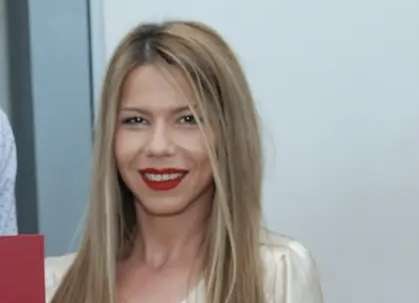Sanja Milić, Phd
Associate ProfessorEducation:
- Bachelor of Science in Pedagogy, Faculty of Philosophy, University of Banja Luka (2009)
- MA in Pedagogy, Faculty of Philosophy, University of East Sarajevo (2012)
- PhD in Pedagogy, Faculty of Philosophy, University of East Sarajevo (2016)
Position :
- 2009 - teaching assistant
- 2013 - senior teaching assistant
- 2016 - assistant professor
- 2021- associate professor
Subjects:
Disciplines:
- Didactic
Subject:
- Didactic 1. Didactic 2,
- Pedagogical communication
- Working with gifted children
- Integrated curriculum
- Contemporary didactic-methodical concepts in class teaching
- Giftedness in preschool age
Other important information:
Research interest: identification and development of giftedness, issues of university teaching, distance education
Publons: https://www.webofscience.com/wos/author/record/AAR-6937-2021
Research Gate: https://www.researchgate.net/profile/Sanja-Milic
Orcid: https://orcid.org/0000-0001-6182-4917
Google scholar: https://scholar.google.com/citations?user=gpemJ_4AAAAJ&hl=hr
Projects:
Coordinator:
Positive education - experiencing psychological well-being and achieving optimal educational achievements 2022
Testing software for assessing giftedness in children (2019)
Development of software for assessing student giftedness (2018)
Member:
Research on educational activities and educational work in the conditions of the KOVID19 pandemic - online teaching, distance teaching, hybrid teaching. Analysis of digital competencies of educators and digital maturity of schools (2021)
Redesigning the web questionnaire software solution and examining the attitudes of the economy according to students' competencies (2019)
Software support for predicting student performance (2018)
Identification of giftedness in elementary school students through assessment (2014)
Improving initial literacy in preschool and early school age (2018)
Selected references:
Publications:
Web Of Science
Q1
Milić, S. & Simeunović, V. (2021). Еxploring e-learning critical success factors in digitally underdeveloped countries during the first wave of the COVID-19. Interactive Learning Environments, DOI: 10.1080/10494820.2021.1990965 IF: 5.4
Milić, S. & Simeunović, V. (2022). Teachers’ roles in online learning communities: a case study from the digitally underdeveloped country, Interactive Learning Environments, DOI: 10.1080/10494820.2022.2081210 IF: 5.4
Q2
Milić, S. & Simeunović, V. (2022). Do gender stereotypes play a role in the process of identifying gifted students in Western Balkan countries? – Case study Bosnia and Herzegovina. European Journal of Education. https://doi.org/10.1111/ejed.12594 IF: 2.4
Simeunovic, V, Milic, S ˛& Pajrok, A. (2022). Higher Education in the Eyes of EconomicOperators. Sustainability, 14(13):7973. https://doi.org/10.3390/su14137973 IF: 3.9
Q3
Milic, S. & Simeunović, V. (2022). Concordance between giftedness assessments by teachers, parents, peers and the self-assessment using multiple intelligences, High Ability Studies, 33(1), 1-19, DOI: 10.1080/13598139.2020.1832445 IF: 1.8
Q4
Milić, S. & Marić, N. (2022). Concerns and Mental Health of Teachers from Digitally Underdeveloped Countries Regarding the Reopening of Schools after the First Wave of the COVID-19 Pandemic’. Work 71(1), 53 – 64. DOI:10.3233/WOR-210885 IF: 2.3
Chapters:
Simeunović, V. & Milić. S. (2017). Application of Data Mining in Predicting the Evaluation Preocess at Postsecondary Educational Establishments - RapidMiner//New Approaches to Research Methodology in Education/ Opić, Siniša; Bognar, Branko; Ratković, Snežana (ed.). Faculty of Teacher Education, University of Zagreb, 79-109.
Other publication:
ERIC (Education Resources Information Center)
Simeunović, V. & Milić, S. (2018). Software Solution of Web Questionnaires for the Analysis of the Economy in Relation to the Competence of Students. Asian Journal of Education and Training, 4(1), 1-8. DOI:10.20448/journal.522.2018.41.1.8, 2018
Milić, S. & Simeunović, V. (2017). Possibility of Identifying the Logical-Mathematical Giftedness with Students of Lower Primary School Grades through Evaluations. Journal of Education and e-Learning Research, 4(4), 154-162. 10.20448/journal.509.2017.44.154.162, 2017
EBSCO
Milić, S. & Simeunović, V. (2016). The Role of Expert Assessment in Early Identification of Above Avarage Abilities of Gifted Students. Bulgarian Journal of Science and Education Policy (BJSEP), 10 (2), 297-313
ERIH +
Milić, S & Bjelica, D. (2022). The influence of the quality of the teacher's instruction on the development of creativity in preschool children. Baština, 58. https://doi.org/10.5937/bastina32-32947
Simeunović, V. & Milić, S. (2022). Determining the content validity of newly constructed research instruments (for example, instruments for assessing the giftedness of school children). Uzdanica, 19(1). 10-46793-uzdanica19-1-269s/
Perdan-Ilić, M. , Đermanov, J. & Milić, S. (2022). Specificities of work organisation in combined class in schools across the republic of srpska from the perspective of teachers. Our school, 28(2), 121–150 https://doi.org/10.7251/NSK2202121P
Books:
Milić, S. & Simeunović, V. (2022): Will the Covid 19 crisis encourage the transition of universities towards Education 4.0 in digitally underdeveloped countries? Bijeljina: Faculty of Education.
Milić, S. & Simeunović, V. (2017). Identification of gifted students in elementary school through assessment. Faculty of Pedagogy in Bijeljina.
Simeunović. V. & Milić. S. (2013). Gifted students in primary school - support and development. EKTOS: Banja Luka.

- Date and place of birth: April 16, 1983, Zvornik
- Phone: +387 55 415 400: 2931
- е-mail: sanja.milic@pfb.ues.rs.ba
- Consultation dates: Tuesday, 9,00 - 10,00 h